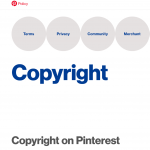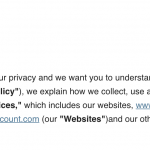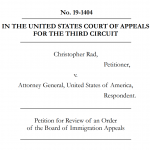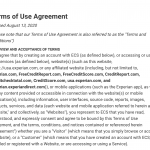
CCPA Data Breach Lawsuit Against Walmart Fails–Gardiner v. Walmart
This is a data breach lawsuit against Walmart in which plaintiff (on his own behalf and on behalf of a putative class) asserts that his data is being currently sold on the dark web. Plaintiff asserted the typical claims, but…

Pinterest Defeats Contributory Copyright Infringement Claim–Davis v. Pinterest
This is a copyright infringement case against Pinterest for allegedly infringing “pins” by users. The plaintiff alleged claims for direct and contributory copyright infringement. Pinterest moved to dismiss the claim for contributory infringement. The court grants the motion. In addition…

Catching Up on the Parler v. AWS Dispute
I blogged Parler’s unsuccessful request to get injunctive relief preventing AWS’s termination of Parler as a customer. Since then, Parler dismissed the federal court lawsuit, filed a state court lawsuit, AWS removed the second lawsuit to federal court, and the…

Social Media Ownership Disputes Part II: Bridal Wear Company Takes Back Control of Instagram Account from Ex-Employee
This is Part II of a review of recent social media ownership disputes. In Part I, I looked at how the Satanic Temple of Washington could not use the CFAA or ACPA to get its Facebook accounts back. Part II…

Social Media Ownership Disputes, Part I: the Satanic Temple of Washington Can’t Get Its Facebook Pages Back
This is part 1 of a 2-part series covering social media ownership disputes. This dispute involves the online accounts of the Satanic Temple of Washington: two Facebook pages, one of which had 17,000 followers, a Twitter account, and a “google…

Data Breach Plaintiff Doesn’t Have Standing in the Absence of Fraud or Identity Theft–Tsao v. Captiva
This is a data breach lawsuit. Plaintiff was a patron of a restaurant (PDQ) that suffered a breach that compromised credit card payment information. The breach occurred because a hacker gained access to customer data through “an outside vendor’s remote…

Ninth Circuit Sends Alexa Surreptitious Recording Case to Arbitration–Tice v. Amazon
Lawsuits over voice-activated assistants (and other smart home devices) are interesting. Plaintiffs have been creative about who asserts the claims to navigate around the issue that often sinks class actions: arbitration. This has resulted in claims brought by neighbors, spouses,…

CAN-SPAM Requires Falsity or Deception, But What Do Those Words Mean?–Rad v. US
This is an unusual federal appellate ruling interpreting CAN-SPAM because it came to the court from the Board of Immigration Appeals. Rad was tried and convicted of violating CAN-SPAM. The Third Circuit affirmed his conviction in 2014. Rad was a…

When Can Plaintiffs Serve Process Via Online Methods? ¯\_(ツ)_/¯
This post recaps three recent decisions dealing with service of process via alternative means (e.g., email or social media). The rulings arise in different contexts so they are useful illustrations of how courts deal with alternative service under different rules….

Continued Access to Service Not Sufficient to Bind User to New Terms of Service–Stover v. Experian
Stover signed up for an Experian subscription for credit monitoring in 2014. She alleged that Experian overstated the relevance of the credit report. She cancelled her subscription in 2014. In 2018, she accessed Experian’s website again, shortly before filing suit….
